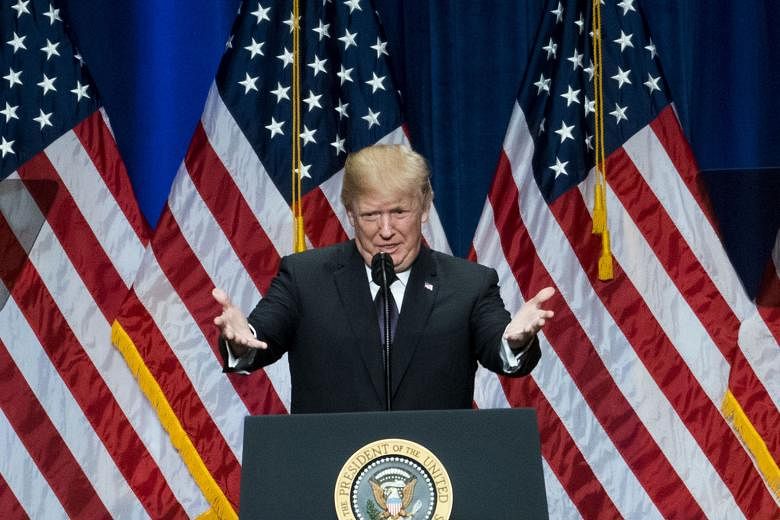United States President Donald Trump's first National Security Strategy (NSS) announced on Monday is consistent with his campaign rhetoric.
It paints the US as challenged by ambitious revisionist powers China and Russia, rogue regimes Iran and North Korea, and under threat from rampant immigration, radical Islamists, unfair trade deals and predatory foreign commercial interests. The response is a bellicose "America First" nationalism - a "great reawakening, a resurgence of confidence, and a rebirth of patriotism, prosperity, and pride" - backed by a beefed-up and modernised military, a strong economy at home and hard-nosed mercantilism abroad.
The NSS was welcomed by hawks like Dr Sebastian Gorka, who boasted of American "hyper power" when he was an adviser in the Trump White House.
"This National Security Strategy is founded on a mantra of 'America first' - not 'America alone' - under which the President and his White House reassert the Judeo-Christian values of the republic and the ties that bind us to those who share those values," he wrote in The Hill.
But the 55-page document also raises concern about the direction of US-China rivalry. It is, in true Trump fashion, characteristically blunt. China and Russia came in for mention as "revisionist" powers that seek to, in effect, take the game away from the US if it does not gear up and defend itself.
"Every other NSS has glossed over the level of strategic competition in the world and this one is brutally frank about the global competition," Dr Patrick Croninfrom the Centre for a New American Security said.

"Trump's NSS is the first to start out anticipating the China challenge - an easier intellectual leap in the wake of (Chinese President) Xi Jinping's triumphalist 19th Party Congress to be sure - but one that will likely shape American strategic thinking for some time to come," wrote Dr Michael Green from the Centre for Strategic and International Studies.
An oft-cited Harvard University study found 16 cases over the past 500 years in which a major rising power threatened to displace a major ruling power - 12 of those ended in war. Mr Xi's 31/2-hour work plan at the party congress was a "storybook version of classic Rising Power, and President Trump's National Security Strategy a model of Ruling Power response", Harvard Professor Graham Allison told The Straits Times.
Apart from China, Asia gets short shrift. The NSS mentions Asean once, along with Apec. Both will "remain centrepieces of the Indo-Pacific's regional architecture and platforms for promoting an order based on freedom".
"We will seek to increase quadrilateral cooperation with Japan, Australia, and India. In South-east Asia, the Philippines and Thailand remain important allies and markets for Americans. Vietnam, Indonesia, Malaysia, and Singapore are growing security and economic partners of the US."
Mr Trump remains undermined by severe political polarisation at home, and ways and means of implementing the NSS are uncertain.
Dr Ali Soufan, chief executive of The Soufan Group, told ST nobody would disagree with the broad goal of pursuing American power and prosperity. But 60 per cent of senior State Department posts are still empty, he noted: "If you want to accomplish engagement around the world to promote US interests or power, you need diplomacy."
Dr Cronin added: "We've not seen Mr Trump build a majority domestically or internationally. It may yet go in that direction but the speech was more in the style of tempestuous combative campaign rhetoric."
Many of Mr Trump's critics have habitually underestimated him. Though his political base is narrow, he plays to it consistently, following through on promises, however divisive, and skilfully blaming the Washington political-bureaucratic-media elite for obstructionism.
How the NSS will translate into policy will be better revealed as other policy papers, including the National Defence Strategy, are rolled out early next year.


